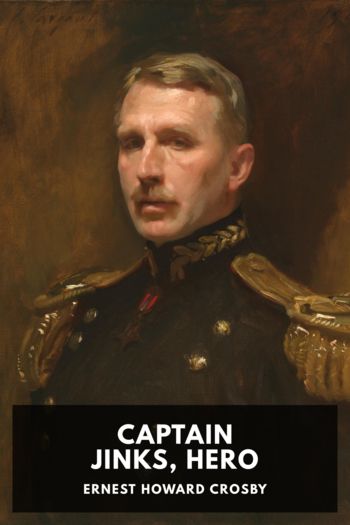Captain Jinks, Hero, Ernest Howard Crosby [free e books to read TXT] 📗

- Author: Ernest Howard Crosby
Book online «Captain Jinks, Hero, Ernest Howard Crosby [free e books to read TXT] 📗». Author Ernest Howard Crosby
It so happened some two or three years after Sam’s mind had begun to follow the paths of warfare that his father and mother took him one day to an anniversary celebration of the Methodist Church at Homeville, and a special parade of the newly organized “John Wesley Boys’ Brigade” of the church was one of the features of the occasion. If Mrs. Jinks had anticipated this, she would doubtless have left Sam at home, for she knew that he was already quite sufficiently inclined toward things military; but even she could not help enjoying the boy’s unmeasured delight at this, his first experience of militarism in the flesh. The parade was indeed a pretty sight. There were perhaps fifty boys in line, ranging from six to eighteen years of age. Their gray uniforms were quite new and the gilt letters “J.W.B.B.” on their caps shone brightly. They marched along with their miniature muskets and fixed bayonets, their chubby, kissable faces all a-smile, as they sang “Onward, Christian Soldiers,” with words adapted by their pastor:
“Onward, Christian soldiers,
’Gainst the heathen crew!
In the name of Jesus
Let us run them through.”
By a curious coincidence their captain had a white feather in his cap, suggesting at a considerable distance the plume of the leaden “hero.” Sam was overcome with joy. He pulled the “hero” from his pocket (he always carried it about with him) and compared the two warriors. The “hero” was still unique, incomparable, but Sam realized that he was an ideal which might be lived up to, not an impossible dream, not the denizen of an inaccessible heaven. From that day he bent his little energies to the task of removing his family to Homeville.
It is not so much strength as perseverance which moves the world. Colonel Jinks had laid up a competence and had always intended to retire, when he could afford it, to the market town. Among other things, the school facilities would be much better in town than in the country. Mrs. Jinks in a moment of folly took the side of the boy, and, whatever may have been the controlling and predominating cause, the fact is that, when Sam had attained the age of twelve, the Colonel sold the farm and bought one of the best houses in Homeville. Sam at once became a member of the John Wesley Brigade and showed an aptitude for soldiering truly amazing. Before he was fourteen he was captain, and wore, himself, the coveted white feather, and his military duties became the absorbing interest of his life. He thought and spoke of nothing else, and he was universally known in the town as “Captain Jinks,” which was often abbreviated to “Cap.” No one ever passed boyhood and youth in such congenial surroundings and with such complete satisfaction as “Cap” Jinks of the John Wesley Boys’ Brigade.
II East PointBut our relation to our environments will change, however much pleased we may be with them, and “Cap” Jinks found himself gradually growing too old for his brigade. The younger boys and their parents began to complain that he was unreasonably standing in the way of their promotion, and a fiery mustache gave signs to the world that he was now something more than a boy. Still he could not bring himself to relinquish the uniform and the white plume. A life without military trimmings was not to be thought of, and there was no militia at Homeville. Consequently he remained in the Boys’ Brigade as long as he could. When at last he saw that he must resign—he was now two-and-twenty—he felt that there was only one course open to him, and that was to join the army; and he broached this plan to his parents. His mother did not like the idea of giving up her only son to such a profession, but Colonel Jinks took kindly to the suggestion. It would bring a little real militarism into the family and give a kind of ex post facto justification to his ancient title. “Sam, my boy,” said he, “you’re a chip of the old block. You’ll keep up the family tradition and be a colonel like me. I will write to your Uncle George about it tomorrow. He’ll get you an appointment to East Point without any trouble. Sam, I’m proud of you.”
Uncle George Jinks, the only brother of the Colonel, was a member of Congress from a distant district, who had a good deal of influence with the Administration. The Colonel wrote to him asking for the cadetship and rehearsing at length the young captain’s unusual qualifications and his military enthusiasm. A week later he received the answer. His brother informed him that the request could not have come at a more opportune moment, as he had a vacancy to fill and had been on the point of calling a public examination of young men in his district for the purpose of selecting a candidate; but in view of the evident fitness of his nephew, he would alter his plans and offer him the place without further ceremony. He wished only that Sam would do credit to the name of Jinks.
It was on a beautiful day in June that “Cap” Jinks bade farewell to Homeville. The family came out in front of the house, keeping back their tears as best they could at this the first parting; but Sam, though he loved them well, had no room in his heart for regret. There was a vision of glory beckoning him on which obliterated all other feelings. The Boys’ Brigade was drawn up at the side of the road and presented arms as he drove





Comments (0)